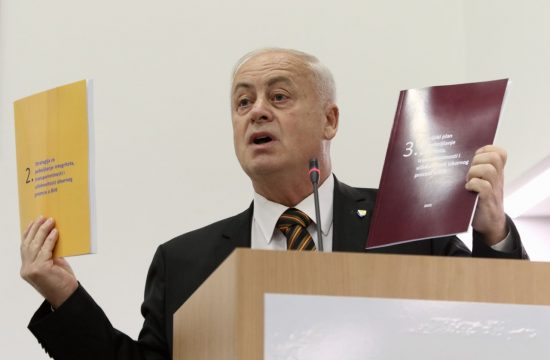
The House of Representatives on Tuesday voted to approve a non-binding resolution that opposes the boycott movement against Israel, a measure that won broad bipartisan support but faced pushback from some high-profile progressives.
The vote was 398 to 17.
The resolution was introduced in March, not long after Democrats faced a bruising internal debate over how to handle comments and tweets by Democratic Rep. Ilhan Omar that were criticized as being anti-Semitic, exposing the divide within the Democratic Party over Israel and US policy towards the country.
Introduced by a bipartisan group of members, the resolution supports a two-state solution, argues the global Boycott, Divestment, and Sanctions (sometimes short-handed as BDS) movement is an effort to delegitimize Israel and urges “Israelis and Palestinians to return to direct negotiations as the only way to achieve an end to the Israeli-Palestinian conflict.”
It also recognizes the right of an American citizen to “protest or criticize the policies of the United States or foreign governments.”
Democratic Rep. Jerry Nadler, who chairs the House Judiciary Committee, and Republican Reps. Lee Zeldin of New York and Ann Wagner of Missouri were initial co-sponsors of the resolution.
Omar, as well as Democrat Rep. Rashida Tlaib of Michigan, have been openly supportive of the BDS movement and critical of the resolution.
Tlaib tweeted earlier this month that the resolution is “unconstitutional” and aims to “silence” opposition to Israel's policies.
The movement is a non-violent activist campaign that aims to put economic and political pressure on Israel over its actions toward Palestinians, including calling for an end to Israeli occupation of the West Bank.
In response to Tlaib's criticism, Democratic Rep. Brad Schneider of Illinois, the lead co-sponsor of the resolution, said Tuesday on CNN that the bill “does nothing of the sort.”
“It does not stop any speech about Israel or anything else. It recognizes the legitimate purpose and just ends of boycotts through our history,” Schneider told CNN's Dana Bash. “But not every boycott is legitimate or just.”
Schneider called the movement anti-Semitic but would not say whether its supporters are also anti-Semitic.
“There are a lot of people who support the BDS movement, but they may not necessarily understand the intent or the expression of … the BDS movement,” he said.
“The movement itself — its intent, its goals — are anti-Semitic,” he added.
Although the debate over Israel and the BDS movement has exposed division among Democrats, the resolution had still been expected to pass with overwhelming bipartisan support.
A number of House Democrats and Republicans joined together to speak in support of the resolution on the House floor on Tuesday afternoon.
Earlier this year, House Speaker Nancy Pelosi praised Schneider's resolution.
“We must also be vigilant against bigoted or dangerous ideologies masquerading as policy, and that includes BDS,” she said at the American Israel Public Affairs Committee (AIPAC) Annual Policy Conference.
The division among Democrats over Israel has been front-and-centre at times this year, an emotional disagreement that falls along generational and ideological divides.
Along with civil rights icon Rep. John Lewis, Omar and Tlaib introduced their own resolution in response to the anti-BDS resolution, affirming that Americans have “the right to participate in boycotts in pursuit of civil and human rights at home and abroad, as protected by the First Amendment to the Constitution.”
Their resolution does not specifically mention the BDS movement.
“If we are going to condemn violent means of resisting the occupation, we cannot also condemn non-violent means,” Omar, who sits on the Foreign Affairs Committee, said last week at the markup of the anti-BDS resolution.
“We cannot simultaneously say we want peace, then openly oppose peaceful means to hold our allies accountable.”
On Tuesday afternoon, Omar's office announced that there are now eight lawmakers — all House Democrats — who have signed on as co-sponsors to her resolution, not including Omar herself.
At this point, it's unclear whether the House Judiciary Committee will take up the pro-boycott resolution.
The GOP-controlled Senate passed anti-BDS legislation earlier this year that would go farther than the House's anti-BDS resolution by making it easier for states to fight against the BDS movement.
Many Senate Democrats opposed the anti-BDS language, saying it violated First Amendment rights of Americans who want to boycott Israel. That measure hasn't been taken up by the House.




